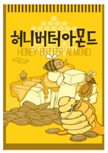IP Report
IP News
Precedent review: Acknowledgement of trademark infringement by “me-too” product (Patent Court Decision October 2, 2019)
Precedent review: Patent Court Decision No. 2019Huh2868 rendered on October 2, 2019
- Acknowledgement of trademark infringement by “me-too” product (the court recognized that the front of a package of “Honey Butter Almond” was imitated)
A “me-too” product is a product that a company manufactures that is similar to a competitor’s product, taking advantage of the popularity of the original product of the competitor. This normally refers to a situation where companies in the food business including the snack industry use brands similar to a competing brand in order to promote sales of their products while exploiting the popularity of the competing product. In doing so, these products sometimes earn themselves the unflattering epithet “copycat brands.”
To prevent “me-too” products from infringing upon the original ones, “an act of imitating the shape of a product manufactured by another person” is defined as an unfair competition act under Article 2(1) of the Unfair Competition Prevention and Trade Secret Protection Act of Korea. However there are limitations in that the scope of the rights of the original product needs to be proved in the course of litigation and a period of protection is only up to three years from commercialization. Accordingly, in the food industry, there recently has been an increase in applications to register a design of the front of a package as a trademark to protect it.
In a recent case handled by AJU KIM CHANG & LEE, AJU claimed that a “me-too” snack product infringed upon a trademark of a popular product of a competitor by imitating the front of the package of the competitor’s product, and succeeded in convincing the Patent Trial and Appeal Board and the Patent Court in Korea.
Recently, the product “Honey Butter Almond” manufactured by GILIM International Co., Ltd. (“GILIM”) has become famous as a must-buy K-food item for those visiting Korea, but products copying the front of the package of such GILIM’s product soon followed which triggered disputes over trademarks. GILIM which previously registered the front of the package of its product as a trademark, claimed that a mark used by the accused company infringed upon their trademark.
|
Registered mark of Honey Butter Almond by GILIM International Co., Ltd. |
The front of the package of Honey Butter Almond by M Company |
|
|
|
In the course of litigation at the Patent Court, M Company claimed that the design used on the front of the GILIM’s package could not function as a trademark. In particular, they argued that considering that the owner of the trademark actually used it in sales of private label products, the figures in the registered trademark could not appropriately function to identify the source (distinctiveness). However, the Patent Court did not accept such argument of M company, and ruled that the product of M company was within the scope of the rights of the registered trademark of GILIM.
In this case, the Patent Court considered the dominant impression of the figures used on the front of the package of M company’s product to be similar to that of the GILIM’s product, and therefore determined that M company’s product was within the scope of the rights of the registered trademark of GILIM.
The two marks are different from each other in the detailed shapes of the bees ( ![]() ,
, ![]() ), the shape of the honey jar (
), the shape of the honey jar (![]() ,
, ![]() ), an upper end pattern (‘
), an upper end pattern (‘![]() ,
,![]() ), the presence of a brown edge, and the presence of the mark ‘
), the presence of a brown edge, and the presence of the mark ‘![]() . However, these are only slight discrepancies that cannot be easily recognized through comparison by recollection. Further, the motifs are considered to be identical based on composition of letters and figures, overall arrangement, personified characters of bees, a bee collecting honey from a honey jar with another dropping a piece of melted butter, and the last bee raising both hands as if to shout hooray, and overall illustration showing a scene from a story or a fairy tale, which lends support to the court’s decision that the dominant impressions conveyed by the entire compositions of the front of the packages are similar to each other.
. However, these are only slight discrepancies that cannot be easily recognized through comparison by recollection. Further, the motifs are considered to be identical based on composition of letters and figures, overall arrangement, personified characters of bees, a bee collecting honey from a honey jar with another dropping a piece of melted butter, and the last bee raising both hands as if to shout hooray, and overall illustration showing a scene from a story or a fairy tale, which lends support to the court’s decision that the dominant impressions conveyed by the entire compositions of the front of the packages are similar to each other.
This decision is significant in ascertaining a principle of law that a figure-combined trademark having similarity in overall and dominant impressions with others is considered to be a similar trademark and recognizing trademark infringement by a “me-too” product which imitates the front of the package of a product.




